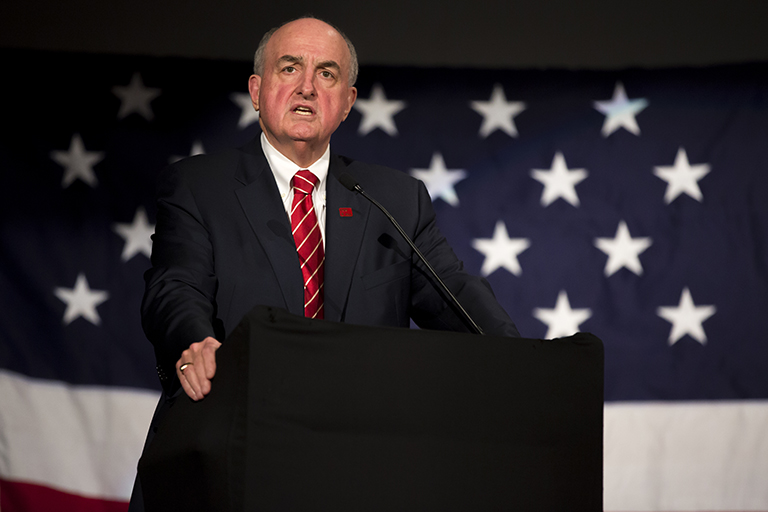At two events in Washington, D.C., IU President McRobbie describes threats to democracy, outlines new national report on securing federal elections

WASHINGTON, D.C. -- Indiana University President Michael A. McRobbie today underscored the importance of university scholars working alongside government, business and community leaders to protect our nation’s democratic systems, including strengthening the integrity and security of the nation’s elections system.
Speaking at an evening reception for attendees of a joint IU-Australian National University symposium on "Making Democracy Harder to Hack," McRobbie described some of the internal and external threats facing the U.S. and democracies around the world and the need for a steadfast collective effort from multiple segments of society to combat them.
"Representative democracy only works if all eligible citizens can participate in elections, have their ballots accurately cast, counted and tabulated, and be confident that their ballots have been accurately cast, counted and tabulated," McRobbie said.
"There is much work to be done, and there will be many obstacles to overcome if we are to build an elections system for the future," he added. "Doing so will require focused attention from citizens, federal, state, and local governments, election administrators and innovators in academia and industry."
The two-day symposium, which continues through Friday and includes academics, civil society groups, policymakers and private-sector representatives, was designed to help foster a bilateral dialogue between the U.S. and Australia with the goal of identifying and managing cyber risk and securing elections infrastructure against foreign interference.
Earlier in the day, McRobbie participated in the public release of Securing the Vote: Protecting American Democracy, a new report of the National Academy of Science and Medicine’s Committee on Voting, which he co-chaired with Lee Bollinger, president of Columbia University. During this event, he presented the committee's key recommendations on ways to make election systems in the United States less vulnerable to hacking, more reliable and verifiable.
Following a two-year study which commenced shortly after the 2016 presidential elections, the NASEM committee recommended that all local, state and federal elections be conducted using human-readable paper ballots by the 2020 presidential election and that every effort be made to use paper ballots in the upcoming 2018 federal election.
The committee, which included computer science and cybersecurity experts, legal and election scholars, social scientists and election officials, also said that ballots that have been marked by voters should not be returned over the Internet or any network connected to it, because no current technology can guarantee their secrecy, security and verifiability.
McRobbie’s participation in the unveiling of the NASEM report and at the IU-ANU symposium coincide with IU continuing to cement its leading role nationally and internationally in protecting critical IT infrastructure from cyberattacks.
Earlier this week, it was announced that researchers from Indiana University’s Center for Applied Cybersecurity Research will oversee the security of data produced by the Large Hadron Collider, the largest physics experiment in the world, as part of a new $25 million institute established by the National Science Foundation.
IU continues to implement the work of securing critical research infrastructure for the nation through the Center for Applied Cybersecurity Research, which McRobbie co-founded in 2003.
Additionally, last week IU announced it had received a $4.9 million grant from the National Science Foundation to fund a new virtual center focused on protecting and securing U.S. research. The IU-led Research Security Operations Center, or ResearchSOC, will help provide the research and education community with the cybersecurity services, training and information sharing necessary to make scientific computing resilient to cyberattacks.
Watch a video with highlights from the "Securing the Vote" report

